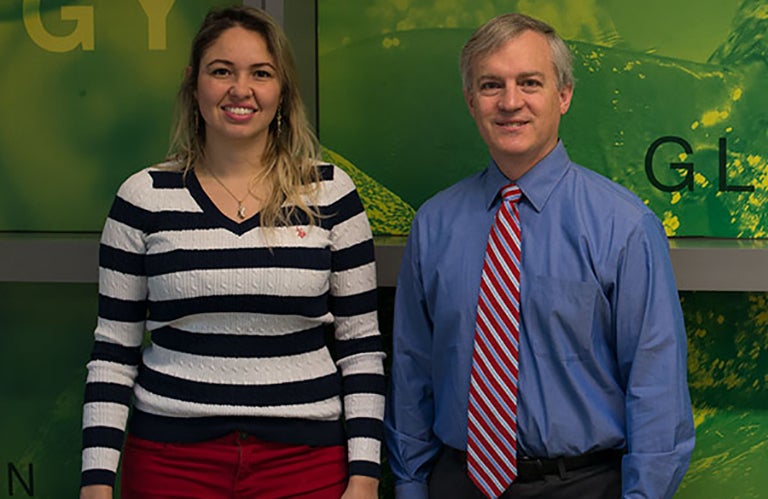Singer, Coelho Publish Influential Review of Parasite Research

Postdoctoral fellow Camila Henriques Coelho and Professor Steven Singer of the Department of Biology teamed up with a Brazilian research team to investigate the spread of an intestinal parasite in Brazil. (Photo: Pat Curran/Georgetown College)
January 24, 2018 — Drinking untreated or “raw” water can lead to the proliferation of parasitic disease, and a team led by Georgetown College researchers is helping better understand how one common parasite spreads.
Biology professor Steven Singer, postdoctoral fellow Camila Henriques Coelho, and a team of Brazilian collaborators published an influential analysis of the spread of Giardia lamblia, an intestinal parasite linked to untreated water and poor sanitation.
“Giardiasis as a neglected disease in Brazil” reviewed all research on the spread of giardiasis, the disease caused by G. lamblia, from 1995-2015 in Brazil. Published in the Public Library of Science (PLoS) journal Neglected Tropical Disease, is the first systematic review of Brazilian incidence of the disease.
“They knew they had it in Brazil, but nobody really bothered to look,” Singer said. “They focused more on Leishmaniasis and Chagas disease, which are endemic and debilitating there. Giardiasis has lower mortality, but very high morbidity — it’s an important disease.”
While it is not a fatal condition, giardiasis can cause severe intestinal distress, including pain, diarrhea and occasionally vomiting. It is among the most common parasitic diseases across the globe, with much higher rates occurring in the developing world.
Singer and Coelho’s team aimed to resolve multiple longstanding questions about giardiasis, including how different genetic subgroups of the parasite affect humans, whether the disease can be passed between humans and animals, and where it is the most prevalent.
The review concluded that areas with poor sanitation and water treatment were most susceptible to outbreaks of giardiasis — an unsurprising finding, but one that may be instructive for Americans considering ingesting “raw water.”
“We’ve reduced many of these infections in this country, so you could free-ride for awhile,” Singer said. “But then the giardiasis outbreaks would hit, and the cryptosporidiosis outbreaks would hit…you’d be rolling the dice.”
The team looked to solve a longstanding mystery in giardiasis research: G. lamblia has eight genetic subgroups, two of which — referred to as Type A and Type B — cause symptoms in humans. But results have varied on how these two types differ.
“People are looking right and left, saying ‘Is Type A the one that causes disease, and Type B doesn’t?’” Singer said. “Many studies have found a difference between the types. The problem is, there’s no consensus on which causes problems.”
The review determined that differences between Types A and B of G. lamblia did not have a meaningful effect on their virulence or effect on humans. It also found that human-to-human transmission is the most common form, but that animals can serve as reservoirs for parasites that later move to humans.
Their conclusions offer a new perspective for researchers seeking to better understand giardiasis.
“We’re trying to challenge the field to stop looking at Type A and Type B,” Singer said. “The genes that people look at when they classify the parasites are ‘housekeeping’ genes, highly unlikely to be related to causing disease at all. A few groups are looking at genetic markers that might have something to do with illness, but we haven’t looked at the presence of those in sick and healthy individual people yet.”
Singer and Coelho’s team chose to publish the review in PLoS Neglected Tropical Disease because it specifically aims to promote research from countries where these diseases are prevalent and whose scientists are underrepresented in mainstream academic literature.
“We try to work with scholars that aren’t just U.S.- or Europe-based,” Singer said. “We help them with several rounds of editing to get their papers to the point that they’re publishable, because we know they often don’t have access to native English speakers for editing purposes.”
In addition to Coelho, four other Brazilian scientists—Mauricio Durigan of the Food and Drug Administration, Adriano de Bernardi Schneider of the University of North Carolina at Charlotte, Diego Averaldo Guiguet Leal of Brazil’s Federal University of Parana, and Regina Maura Bueno Franco of Brazil’s State University of Campinas—collaborated on the review.
Singer’s next project will focus on the human immune response to G. lamblia and other parasites.